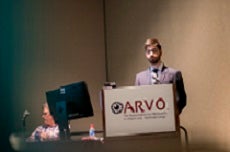

The group’s research is using polarization imaging, developed by Prof. Campbell, to detect and characterize amyloid deposits in the retina. Amyloid-beta is a protein considered to be a bio-marker for Alzheimer’s disease, and is found in deposits in the brain of patients with Alzheimer’s disease. Currently, deposits of amyloid plaques in the brain can only be detected through expensive diagnostic techniques and only definitively after death. By detecting amyloid in the retina, Prof. Campbell’s research is paving the way for a non-invasive technique in the early detection of Alzheimer’s disease.
ARVO is an annual conference that brings together over 11,000 researchers from across the globe to share the latest advances in vision research. Prof. Campbell, together with students Frank Corapi and Mengyuan Ke, and research assistants Rachel Redekop and Laura Emptage, are sharing their latest research through conference and poster presentations on: image polarization and auto-fluorescent signals of amyloid beta deposits in the retina; cone photoreceptors and optical signals for in emmetropization for astigmatism; and the effects of Lafora disease on the retina.